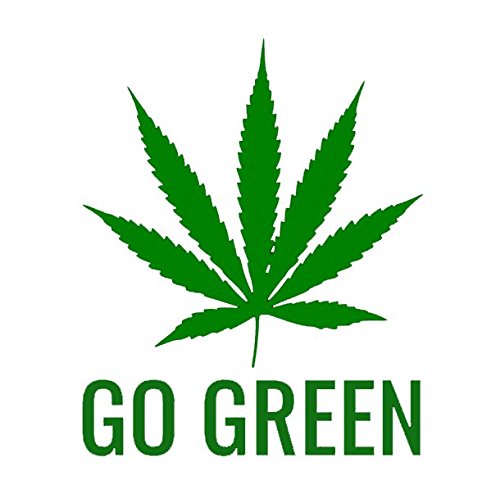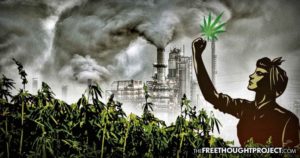By Matt Agorist, April 6, 2019, thefreethoughtproject.com
After hemp was legalized nationwide in December, the mainstream media is now forced to report on its benefits, including how it can directly compete with big oil.
Because government is the antithesis to freedom, industrial hemp has been banned nationwide since 1937 ostensibly due to the plant’s similarities to marijuana. Many have speculated that this move was also due to the fact that cannabis is in direct competition with the pharmaceutical industry by providing far safer alternative treatments as well as directly competing with the petrochemical industry.
However, all this changed in December after President Donald Trump signed the Agriculture Improvement act of 2018, legalizing industrial hemp on a national scale.
Despite this move, law enforcement across the country continue to go after entirely legal businesses for selling this THC-free version of the cannabis plant. However, they are quickly being exposed for the tyrants that they are. Even the mainstream media—who have long suppressed and ignored the benefits of the hemp plant—are now forced to cover its benefits.
In an article out of Forbes this week, titled, “Industrial Hemp Is The Answer To Petrochemical Dependency,” the case is made for an environmentally friendly solution to the monopoly the petrochemical industry has had over fuel and plastics.
As Forbes reports, “our dependency on petrochemicals has proven hard to overcome, largely because these materials are as versatile as they are volatile. From fuel to plastics to textiles to paper to packaging to construction materials to cleaning supplies, petroleum-based products are critical to our industrial infrastructure and way of life.”
But all this is now changing. Thanks to the many states who chose to disobey hemp prohibition, the federal government was forced to legalize it nationally.
As Forbes points out:
The crop can be used to make everything from biodegradable plastic to construction materials like flooring, siding, drywall and insulation to paper to clothing to soap to biofuels made from hemp seeds and stalks. Porsche is even using hemp-based material in the body of its 718 Cayman GT4 Clubsport track car to reduce the weight while maintaining rigidity and safety.
The shift from petrochemical dependency to a sustainable model of hemp production is not only going to help remove the world’s dependency on big oil, but it is an necessity if we are going to maintain a healthy planet.
Right now, one garbage truck of plastic is being dumped into the ocean every minute.
This disturbing reality is underscored by the recent discovery of another giant patch of plastic—bigger than Mexico—floating in the South Pacific Sea. It was discovered by Captain Charles Moore, who found the North Pacific Garbage Patch in 1997.
One million seabirds die each year from ingesting plastic, and up to 90 percent have plastic in their guts. Microplastic (resulting from the breakdown of larger pieces by sunlight and waves) and microbeads (used in body washes and facial cleansers) are the ocean’s smog. They absorb toxins in the water and enter the food chain, from the smallest plankton to the largest whales, as well as humans.
Lawmakers unable to see past the act of scribbling on legal paper to solve problems have been suppressing the ability of humankind to free themselves from this problem with free market solutions like hemp. Instead of pushing to legalize hemp and help to cultivate infrastructure that would boost its production, states like California moved to make straws illegal. Nice work Cali.
Plastic in the ocean is a very real danger to the environment and all life on the planet. But, are waiters and straws responsible? Should they be thrown in jail for offering a customer a straw with their iced tea?
No, and anyone who supports such tyranny does more to hinder the progress of humanity than any waiter giving a customer a staw ever would. In fact, government created the plastics problem in the first place by banning hemp.
There are solutions—outside of the police state.
Hemp, one of the most useful plants on the planet, has thousands of applications, including making plastic that is biodegradable and non-toxic.
Fuel is an option as well. In fact, the first cars were initially built to run on ethanol, or alcohol, which could also be derived from hemp. Henry Ford even famously designed a car model that ran on hemp fuel and was partially built with hemp as well.
Because of government however, alcohol and cannabis prohibition made it impossible for these types of engines to be on the market, so the industry turned to gas and oil, which has had devastating consequences for the environment in just the last century.
Now, it appears that this paradigm is shifting. It will, however, take some time.
As Forbes notes, because prohibition has been in place for so long, the infrastructure needed to make a revolutionary change to the market is simply not there yet.
This infrastructural vacuum has created challenges around everything from seed genetics to planting to irrigation to harvesting to processing to pricing to distribution.
***
While the trends favor hemp, they are unlikely to allow industrial hemp to outproduce or outcompete petrochemical products any time soon. Nevertheless, the growing understanding of, interest in and infrastructure for hemp will certainly allow it to have a permanent place in our economy, one that will contribute to a greener, healthier world.
And just like that, we see how less laws—not more—pave the way for sustainable innovation and environmental efficiency.


